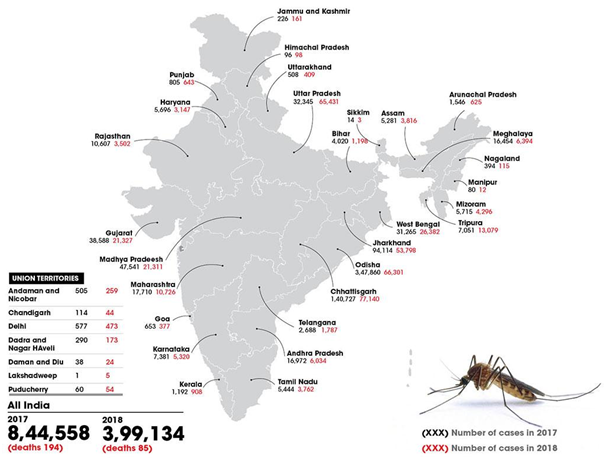

April 25 is observed as World Malaria Day. This World Malaria Day, make the effort of spreading as much awareness about malaria as possible and take up tips for prevention at all times. This year the theme is “Zero malaria starts with me”.
Context
April 25 is observed as World Malaria Day. This World Malaria Day, make the effort of spreading as much awareness about malaria as possible and take up tips for prevention at all times. This year the theme is “Zero malaria starts with me”.
About
What is Malaria ?
- Malaria is caused by a Plasmodium Parasites that is transmitted from one human to another by the bite of infected Anopheles mosquitoes.
- In humans, the parasites (called sporozoites) migrate to the liver where they mature and release another form, the merozoites.
- The majority of Malaria symptoms are caused by the massive release of merozoites into the bloodstream such as anaemia is caused by the destruction of the red blood cells.
- There are five parasites that can cause Malaria in humans and the deadliest of all is Plasmodium Falciparum.
- Children under the age of 5 and pregnant women are most susceptible to the disease.
- More than 70 per cent or two thirds of total malaria deaths constitute children under the age of 5.
Symptoms of Malaria :
- People who have malaria usually have high fever, experience shaking chills and feel very sick.
- Apart from fever and chills, malaria also causes headaches, nausea, vomiting, muscle pain, fatigue, chest pain, cough and sweating.
Spread
- If an infected mosquito bites one person then that person becomes infected with malaria parasites and can spread them to other people.
- Malaria can also spread from mother to unborn child, through blood transfusions and by sharing needles used to inject drugs.
Malaria prevention
- Malaria can be prevented by avoiding travelling to place where incidence of the disease is high - like tropical and sub tropical areas. Those who are at high risk of malaria include older adults, young children and infants, pregnant women and their unborn children, travellers coming from areas where there is no malaria.
- Wear clothes that cover the whole body properly, especially if going to damp areas where mosquitoes can breed.
- Apply insect repellents on skin and even on clothes. In times when malaria incidence is high in surroundings, sleep under a net.
- Anyone who exhibits signs of malaria should go for diagnosis immediately. A parasitological test is important for malaria diagnosis.
Reports
- India has the third-highest burden of malaria cases in the world and contributes to more than 89 per cent cases in the south-east region.



